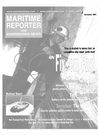
I M O Adopts Anti-Fouling Convention
A new IMO convention prohibits the use of harmful organotins in anti-fouling paints used on ships and will establish a mechanism to prevent the potential future use of other harmful substances in anti-fouling systems. The International Convention on the control of harmful anti-fouling systems on ships was adopted on October 5.
Under the terms of the new Convention, Parties to the Convention are required to prohibit and/or restrict the use of harmful anti-fouling systems on ships flying their flag, as well as ships not entitled to fly their flag but which operate under their authority and all ships that enter a port, shipyard or offshore terminal of a Party.
Ships of above 400 gt and above engaged in international voyages (excluding fixed or floating platforms, FSUs and FPSOs) will be required to undergo an initial survey before the ship is put into service or before the International Anti-fouling System Certificate is issued for the first time; and a survey when the anti-fouling systems are changed or replaced.
Ships of 79 ft. (24 m) or more in length but less than 400 gt engaged in international voyages (excluding fixed or floating platforms, FSUs and FPSOs) will have to carry a Declaration on Antifouling Systems signed by the owner or authorized agent. The Declaration will have to be accompanied by appropriate documentation such as a paint receipt or contractor invoice. Anti-fouling systems to be prohibited or controlled will be listed in an annex (Annex 1) to the Convention, which will be updated as and when necessary.
Other stories from November 2001 issue
Content
- Setting A New Course page: 6
- Towards the Intelligent Engine page: 8
- High-Speed Debut on the Lakes page: 9
- FGH Announces Two N e w Contracts page: 10
- IZAR Races Ahead With New Transmed Ferry page: 12
- NASSCO Wins $ 7 0 8M T-AKE Contract page: 19
- Austal Wins Two Contracts page: 20
- CIT Takes Issue With Customs' Duty Calculation in Dry-Docking Case page: 21
- NORSHIPCO Weathers the Economic Storm page: 24
- Newport News Shipbuilding: A City Within A Shipyard page: 25
- Mobile Yard Stays Busy With Offshore Work page: 28
- Shiprepair Forum Changes to Reflect Current Events page: 30
- A&P Shipcare Stays Busy page: 32
- Cochin Shipyard Is Poised For Growth page: 33
- HSR Completes GLM Rig Upgrades page: 34
- Where Is the All-Electric Navy? page: 36
- Deepwater One Delivers $ 2 . 3B Proposal to USCG page: 44
- Cost Estimating: A Crucial Tool for Planning page: 46
- Taylor To Head Tidewater page: 48
- Brinson N e w N W C Chairman page: 48
- Marco Shipyard: Rolling With The Changes page: 51
- Bollinger Delivers Patrol Boat page: 58
- Tug Automation Control System Helps Eliminate False Alarms page: 61
- Keeping an Eye on Fuel Costs page: 67
- $120M NYC Ferry Deal Goes To Manitowoc Marine Group page: 73
- I M O Adopts Anti-Fouling Convention page: 75
- Security is Synonymous With Safety page: 76
- Liebherr Enjoys Success In Far East page: 82

